Powerful cravings make binge eating hard to control. Winter has always been the toughest season for me.
It was very terrible in the winter of 2011. I sat there contemplating the best way to end my own life, hands clenched around my knees.
I had been experiencing the same feeling intermittently for fifteen years, and hopelessness barely touches the surface of it. I was 23 years old. I had been in the dark for half of my life.
I explained the math: Agonizing Existence = Depression + Eating Disorder.
I had finally come to terms with the fact that I needed help. I so made a commitment to terminate my misery while I sat there. “I am going to give this one last push,” I told myself. I will do everything in my power to break the cycles of binge eating and self-starvation as well as this ongoing depression. I will simply commit suicide if it does not work.
It was that easy.
I had changed my mind about killing myself by the end of 2011. After a few years, I had entirely given up binge eating. I have never been happier than I am now. I no longer experience depression. I strive to live each day with thankfulness, joy, and well-being, and I am in good physical and mental health.
I am sharing with you six important steps that I found crucial to my path because I know you can achieve this too.
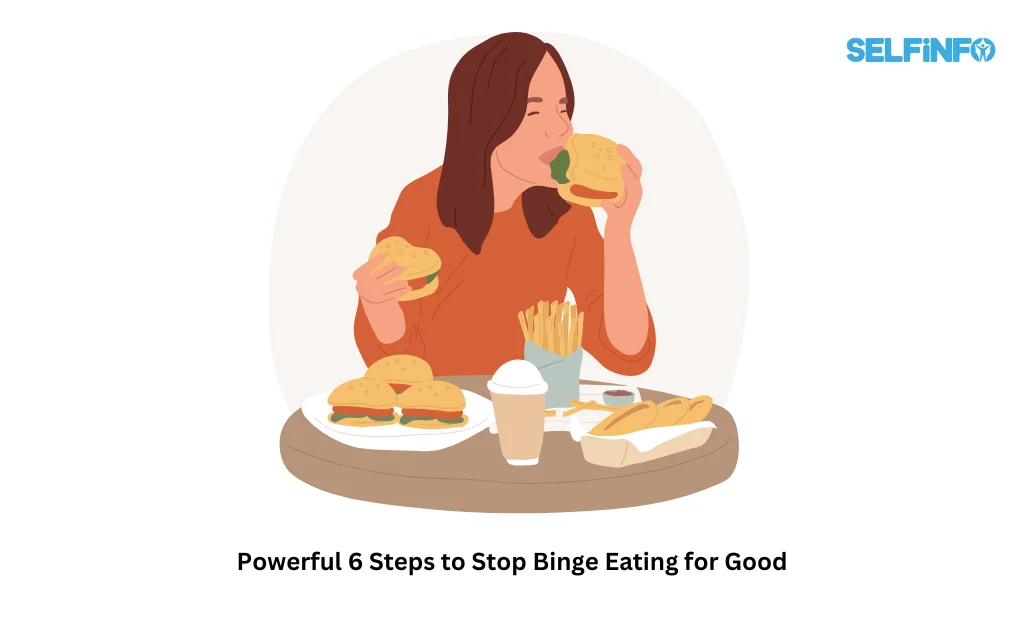
1. Realize there’s nothing wrong with you.
I understand that binge eating makes you feel like a horrible, repulsive person. I am aware that you have no idea what is happening or what has occurred to your “willpower.” I am aware that you are beginning to lose your mind.
But pay attention: you are perfectly OK.
Emotions, not food, are the driving force behind binge eating. People use a variety of strategies to manage their emotions. When you are feeling very upset, you may use drugs, consume alcohol, become very upset with others you care about, experience anxiety attacks, or overeat.
This is not a call for judgment. Binge eating is simply your attempt to cope as best you can with challenging emotions at the moment. That does not imply that you are broken, that you will “be like this forever,” or that you are incapable of developing new and more effective coping mechanisms.
Wanting to feel better is very normal and natural. Therefore, even though bingeing is not ideal, remember that it is normal and human.
2. Reattach your head to your body.
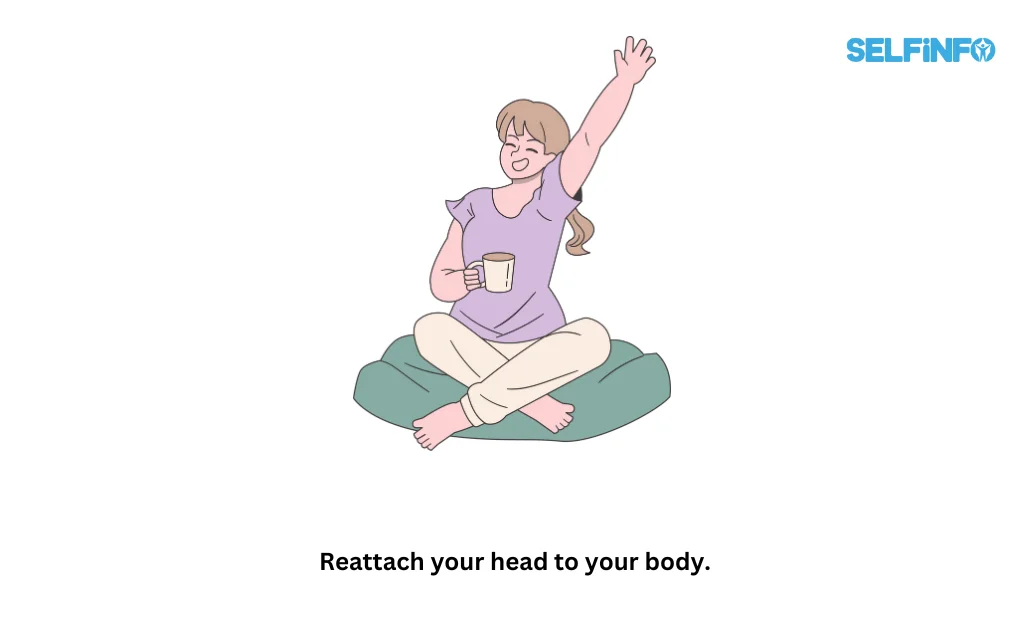
I was unaware that I had a body until I was twenty-three.
I will always remember this: one day, while I was walking up a hill to my workplace (I was then pursuing a Ph.D.), I suddenly felt awful. I was then annoyed that after feeling fine, everything had suddenly been intolerable.
After learning about mindfulness, I performed a body scan, which involves using your mind to “scan” every region of your body and observe anything there without passing judgment.
Do you know what I discovered? Simply put, walking up the hill made me really heated.
I felt immediately better after removing my outerwear.
For me, this was a significant moment. I had been in my head for so long that I had forgotten I had a body, that it had needs, and that I needed to pay attention to them.
In addition to restoring your awareness of your body’s physical sensations (such as temperature and mild, non-threatening hunger sensations), mindfulness improves your emotional regulation (more specifically, it increases activation of the medial prefrontal cortex and decreases activation of structures like the amygdala that set off our emotional reactions).
For those who are binge eating, that is good news. Your mind and body may be at odds right now, but by practicing mindfulness to better manage your emotions, you will begin to learn how to choose whether or not to pay attention to those emotional cues.
3. Shift your self-worth.
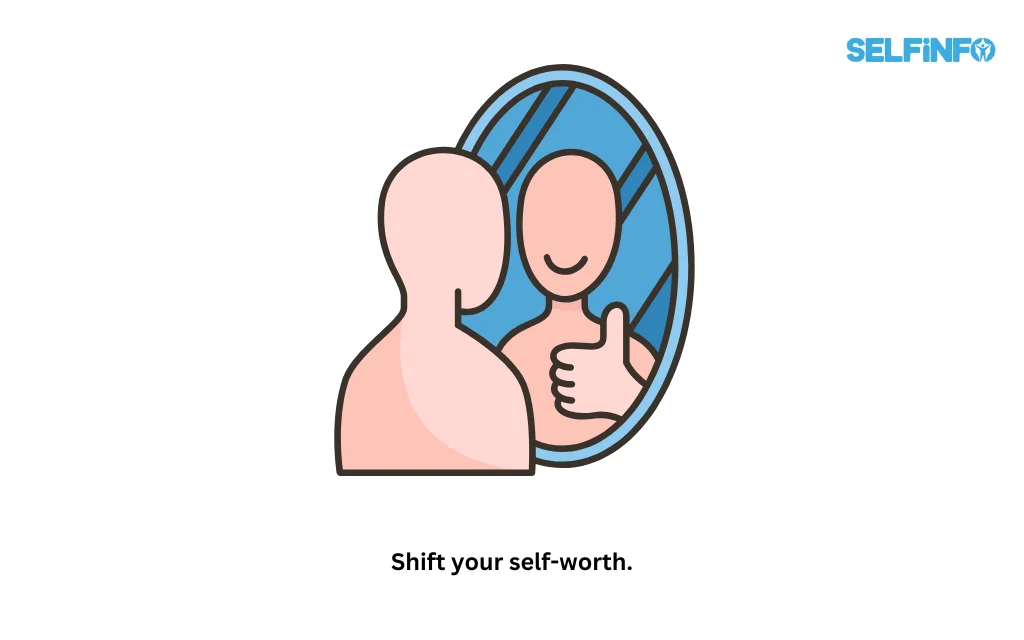
Although I have always been sporty, I made the decision to “become in the greatest form of my life” while I was a university student. I worked out too much, doing high-intensity bursts several times a day. I developed an obsession with my diet. I checked my belly in the mirror whenever I could and weighed myself several times a day. Everywhere I went, I felt extremely self-conscious and constantly referred to myself as obese.
All I saw was fat, fat, fat, even though I was actually a skeleton.
I was at a loss for what to do when my restrictive diet and compulsive exercise escalated into binge eating. After “all that progress I would made,” I was extremely ashamed of what I was doing to my body and what I was doing.
My entire sense of value came from my appearance and my thinness. Binge eating seemed to go against all I believed in.
I joined a gym and started strength training after deciding I needed to be stronger both mentally and physically. I felt totally out of control when I binge ate, but by going to training regardless of how I was feeling, I began to see that I did have control and could still behave as I wanted to, even if I did not feel like it.
I understood that I always had options.
I should mention now that strength training has been beneficial to my recuperation, but you do not have to
In fact, I ultimately realized that I was overly preoccupied with my performance, even while my dedication to strength training temporarily increased my sense of self-worth (and helped me quit binge eating). I never felt like I was doing enough, succeeding enough, or being enough.
Since we are all so much more than our appearance, weight, and level of performance, I advise taking a multifaceted approach to enhancing your sense of self-worth. Focus on a number of things rather than just your physical health, such as being a good friend and family member, acting honorably and truthfully, and taking care of yourself so that you can give back to others.
When you are in this deep, it is an indication that you need to diversify your identity away from perfection, dieting, intense exercise, and excessive work. Many binge eaters are overachievers and perfectionists.
Rather, I advise attempting to determine what you genuinely value in life and then concentrating on the process of developing into the person you aspire to be.
Step of action: Spend some time reflecting about your life’s values. Whether you agree or not, I do not want the only thing that people may say about me when I am near death to be:
“Well, she had a six pack, at least.”
No. For both myself and the others in my life, I aspire to be so much more than a mere body. I want to be strong, caring, supportive, and motivating. I am looking for love.
Do you think it is important to be a good sibling, parent, friend, or artist? Do you think your health is important? Would you be able to begin expressing thankfulness for your body and everything that you have in life? Could you just sit, breathe, and act like a human?
4. Find the diamonds in the turd.
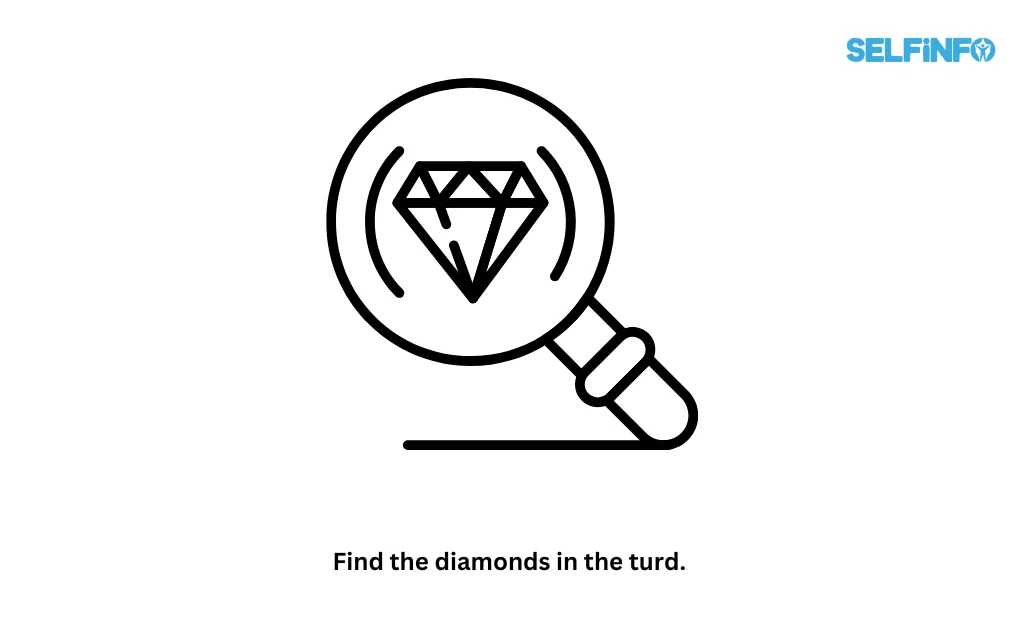
You are currently preoccupied with all the times you binge, when you get intense cravings to eat, and all the other things you are doing “wrong.” However, I can assure you that you are doing a lot of things correctly.
These are what I refer to as the diamonds in the dung.
For instance:
Perhaps the strong impulse to overeat occurs for only two to three hours every evening. You are concentrating on that period of time right now, but consider this: you do not want to binge for twenty-one hours of the day. That is fantastic! Knowing when you are most likely to binge will help you quit, thus it is also powerful information.
Perhaps you have noticed that you are more likely to binge after a poor night’s sleep or when you are feeling anxious, upset, or worried. Is getting more sleep possible? Is it possible for you to schedule additional time for your overall well-being?
When you look in the mirror and criticize your appearance, or when you browse Instagram and see athletes, models, and other joyful individuals who you wish you looked like, you may realize that your want to binge is stronger. Can you spend less time on social media or follow only those who genuinely assist you? Can you treat yourself more kindly when you look in the mirror?
You will discover that there are many things you are doing well if you begin to observe your own behavior and start to investigate it rather than criticize it. This implies that you can start spending more time on the things that are beneficial (such as getting more sleep and setting aside time for yourself) and less time on the things that are detrimental (such as social media, diet blogs, and your cruel, negative self-talk).
Try creating a tally sheet of how many times you find yourself thinking about food today if you are not even sure where to begin. This will increase your awareness of your thoughts, increasing the likelihood that you will be able to recognize them and say:
- “All right, I am considering eating. Does this imply that I currently require something else?
- Or simply “Well, I hear this idea, but it is not useful at the moment.” Let us concentrate on something different.
Additionally, it will alert you to the frequency of times when your food-related thoughts are absent:
“All right, I caught myself having 37 food-related fantasies today, but I have 50,000 ideas every day! Therefore, eating is not on my mind all the time. When do I not think about eating, then? Can I do it again?
Step of action: Look for your gems in the feces.
- What makes the periods when I do not binge eat or do not want to binge eat different?
- When I want to binge and when I don’t, where am I?
- What am I doing?
- Is it possible for me to do less things that do not help and more things that do?
5. Stop restricting.
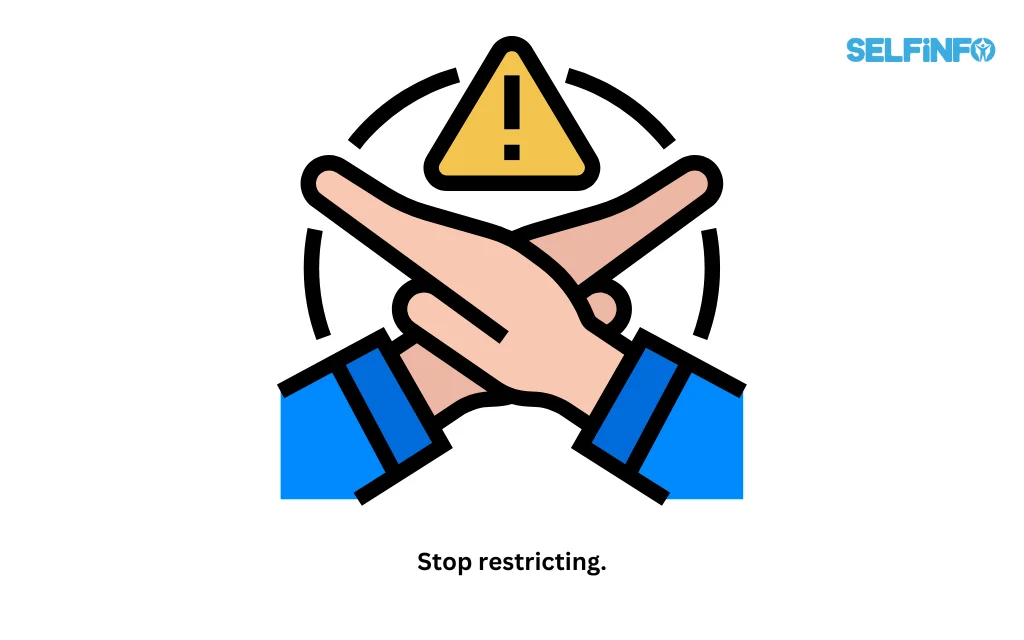
Diets and binge eating are strongly correlated, according to numerous scientific research. (An overview of one of the studies is provided here.)
One of the finest things you can do right now if you are having trouble quitting binge eating is to stop limiting yourself. This entails allowing yourself to consume any meal at any moment. It means not overexercising because you “slipped up” or starving yourself the day after a binge.
People usually hesitate a lot when I offer this to them. I completely get it. You are afraid to try something new since you have been dieting and limiting your consumption for so long. However, binge eating is not helping you anymore, and you will not be content unless you eat enough or what you are truly seeking.
Instead, raising your tongue’s awareness can boost your level of satisfaction (both mentally and physically). What is the sensation of your tongue in your mouth? What is the sensation and flavor of the food on your tongue?
Many people discuss mindful eating, which will undoubtedly be beneficial—but only if it does not feel constrictive. It is perfectly acceptable to eat when you are not hungry if “eating only when you are hungry” feels too restricting at the moment. It is acceptable to take a break from “eating thoughtfully” if it feels too restricting.
One mindful bite every meal, then one mindful bite per day, can be introduced when you are ready.
6. If you do binge, follow these three steps.
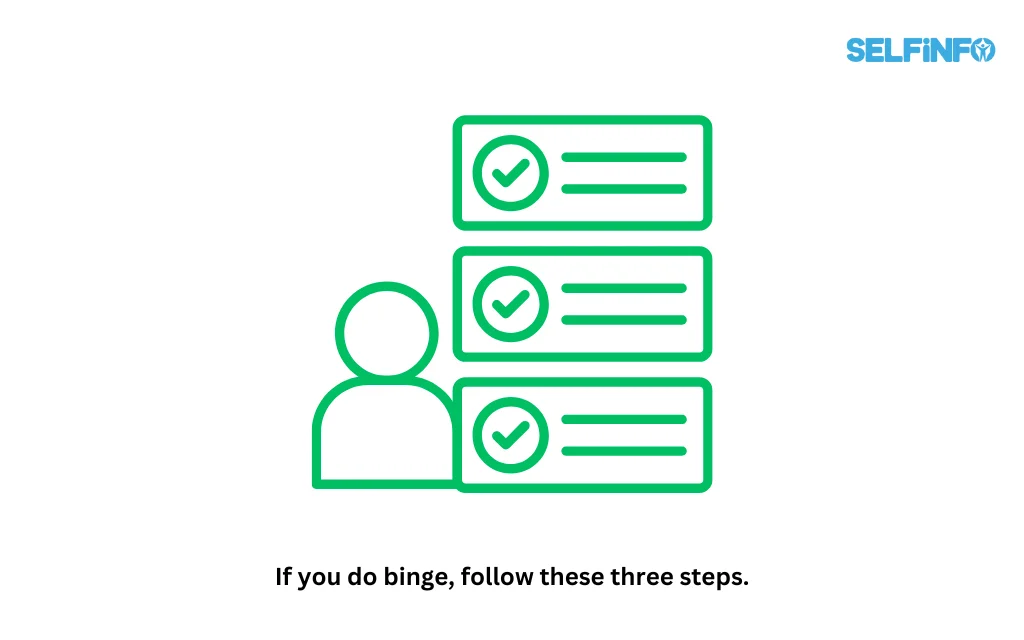
You will “fall up” on this road, I promise, but that is okay. You are currently gaining the skills necessary to manage in a healthier and more effective manner. It requires time.
If you binge eat, follow these three measures to help yourself:
Step 1: Instantly forgive yourself. You did not act in the best way throughout that difficult time. It is alright, you are learning and you are a human. Say to yourself what you would say to a buddy who is experiencing the same situation.
Step 2: Make an effort to learn more about what transpired. Attempt to identify the cause. Was the day especially stressful? Did you have thoughts racing through your mind? The next time that occurs, how may you improve your self-care?
Step 3: Try to eat a “regular” meal (simply some basic vegetables, protein, carbs, and fats) when you are next hungry. Do not try to confine yourself or overthink it.
You will constantly be hungry again, which is a beautiful thing. And when you are, you have another chance to learn how to pay attention to your body’s natural hunger cues.
Lastly, keep in mind that there are more positive aspects of you than negative ones as long as you are still breathing.
